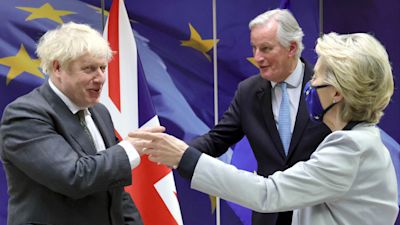Four days for a deal: Dominic Raab says decision on post-Brexit free trade agreement by Sunday

Video report by ITV News Political Reporter Shehab Khan
The UK and EU have given themselves just four days to reach a post-Brexit trade deal, with Sunday the new deadline for finding agreement on what are said to be "significant differences" between the two sides.
Foreign Secretary Dominic Raab said negotiators will "leave no stone unturned" as they seek to bridge the gap on fisheries, the so-called level-playing-field, and governance of the deal, but there will be a "decision on the future of the negotiations on Sunday".
The senior minister's words come following an unavailing face-to-face meeting between Boris Johnson and EU chief Ursula von der Leyen, which ended with both sides saying large gaps remained in their positions.
But the PM's trip to Brussels on Wednesday evening, which was aimed at using political impetus to unblock the barriers to a free trade deal, was not a complete waste of times, with both leaders agreeing their chief negotiators should continue talks through the week.
Crunch Brexit talks end in Brussels with both sides pledging to continue negotiations
Turbot-charged trade talks? Johnson and von der Leyen chat over fish supper
In a statement following three hours of dinner and discussions, a senior Number 10 source said it was “unclear” whether the differences between the two sides could be bridged.
ITV News Political Editor Robert Peston says a no deal outcome is "overwhelmingly likely".
On Wednesday he said "it is difficult to see" how an agreement can be reached, with the EU demanding the ability to impose tariffs on UK exports in the future if the EU tightens its rules relating to the level-playing field, and the UK does not follow.
Mr Raab said the prime minister's trip to Brussels has shown "his will, his flexibility to get things over the line" but the idea that the UK would "pegged to EU rules, not just now but in the future, that's not something I think we can accept or any self-respecting prime minister of this country can accept.
Brexit trade talks - the sticking points at a glance:
- Fishing rights: The UK wants total control over its own fishing waters after the Brexit transition period ends, with a 12 mile exclusion zone around the British Isles banning all foreign vessels. The EU wants the UK to stick to the Common Fisheries Policy, an EU agreement which gives member nations the rights to fish in European waters - more here.
- Level Playing Field: This is a concept all EU nations agree to, which ensures member nations cannot undercut others by setting their own rules on issues such as the environment, taxation and state aid. The EU says a zero-tariff trade deal is dependent on the UK agreeing to a level playing field. The UK disagrees, saying a fundamental aspect of Brexit is that the UK will be able to set its own rules.
- Governance of a deal: It's likely that any trade deal will eventually result in disputes. The EU wants the European Court of Justice to be the final authority in ruling over disputes. The UK says the ECJ should have no role and final decisions should be made by a bespoke arbiter.
But the statements from both sides suggested that while further discussions would be held, substantial movement on the key issues had not been made.
On Thursday, the European Commission set out contingency measures aimed at coping with the disruption if no trade deal can be agreed with the UK.
The measures would ensure basic reciprocal air and road connectivity between the EU and the UK - and allow for the possibility of reciprocal fishing access.
European Commission President von der Leyen said: "Negotiations are still ongoing.
"However, given that the end of the transition is very near, there is no guarantee that if and when an agreement is found, it can enter into force on time.
"Our responsibility is to be prepared for all eventualities, including not having a deal in place with the UK on January 1."
A statement released by Ms von der Leyen following the dinner said: "We had a lively & interesting discussion on the state of play on outstanding issues.
"We understand each other’s positions. They remain far apart.
"The teams should immediately reconvene to try to resolve these issues. We will come to a decision by the end of the weekend."
The leaders agreed to make a “firm decision” about the future of the talks by the end of the weekend, and asked their chief negotiators Lord Frost and Michel Barnier to reconvene for further meetings in Brussels on Thursday.
Their meeting came ahead of a European Council summit on Thursday where Mrs von der Leyen is expected to debrief the leaders of the 27 member countries on the state of play with the negotiations.
Just three weeks remain until the current transitional arrangements expire.
Failure to reach agreement would see tariffs imposed on UK exports to the EU, the country’s biggest trading partner, and could also increase bureaucracy.
The Office for Budget Responsibility has suggested that a no-deal outcome could wipe 2% off gross domestic product, a measure of the size of the economy, in 2021.
The Bank’s governor Andrew Bailey has warned the long-term damage caused by a no-deal situation would be worse than the economic hit from coronavirus.